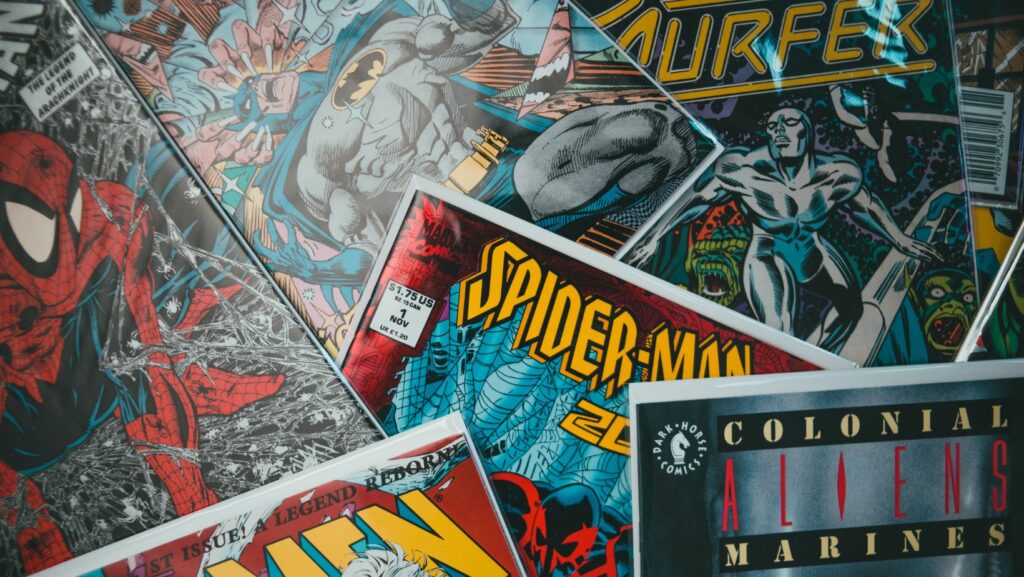Marvel Entertainment
- Rich Legacy: Marvel Entertainment, founded in 1939 as Timely Publications, has transformed from comic books to a multimedia powerhouse, shaping global pop culture.
- Innovative Storytelling: The launch of the Marvel Cinematic Universe (MCU) in 2008 revolutionized filmmaking with interconnected narratives, resulting in over 30 blockbuster films.

- Iconic Characters: Marvel’s lineup includes beloved superheroes like Spider-Man, Iron Man, and the X-Men, each representing relatable themes of struggle, heroism, and identity.
- Cultural Impact: The brand addresses societal issues through its storytelling, particularly with the X-Men’s themes of acceptance and diversity, fostering a connected fan community.
- Box Office Dominance: With over $28 billion in global box office revenue, Marvel remains a leading force in the film industry, with major hits like “Avengers: Endgame” and “Spider-Man: No Way Home.”
- Engagement Strategies: Marvel’s active fan engagement through conventions, social media, and merchandise helps maintain interest and loyalty across generations.
Marvel Entertainment stands as a titan in the world of storytelling, captivating audiences with its rich tapestry of superheroes and intricate narratives. From the comic book pages to blockbuster films, Marvel has redefined the entertainment landscape, creating a universe where imagination knows no bounds.
With iconic characters like Spider-Man, Iron Man, and the Avengers, it’s no wonder that Marvel’s influence extends far beyond comic shops and movie theaters. The brand has cultivated a passionate fanbase, driven by thrilling plots and unforgettable moments that resonate across generations. As Marvel continues to expand its horizons through innovative content and strategic partnerships, the excitement surrounding its universe only grows.
Overview Of Marvel Entertainment
Marvel Entertainment stands as a leading force in the entertainment landscape, recognized for its rich legacy and transformative storytelling. Founded in 1939, Marvel initially operated under the name Timely Publications. The company grew to prominence through engaging comics featuring iconic characters such as Captain America, Thor, and the Hulk.
Marvel’s transition into the film industry marked a notable expansion of its influence. The Marvel Cinematic Universe (MCU), launched in 2008 with “Iron Man,” revolutionized blockbuster filmmaking by creating interconnected narratives that span across multiple films. As of 2023, the MCU includes over 30 feature films, drawing millions of viewers worldwide. The success of the franchise has solidified Marvel’s place in global pop culture.
Marvel’s media presence extends beyond films to television, merchandise, and digital platforms. The company produces acclaimed series like “WandaVision” and “Loki” on Disney+, further enriching its storytelling approach. Marvel’s licensing agreements and partnerships enable a wide range of merchandise, attracting a diverse audience base and generating substantial revenue.
The brand actively engages with its fanbase through comic book conventions, social media campaigns, and interactive experiences. This strategy fosters a strong community that celebrates Marvel’s characters and narratives, ensuring sustained interest and loyalty.
This commitment to innovation and audience engagement supports Marvel Entertainment’s continuous evolution within the entertainment industry. The company’s ability to adapt to changing trends while maintaining its core values fuels ongoing excitement and anticipation among fans.
History Of Marvel Entertainment
Marvel Entertainment, originally known as Timely Publications, launched a legacy of innovation in storytelling and entertainment starting in 1939. Its evolution into a cultural powerhouse highlights numerous significant developments throughout the decades.
Founding And Early Years
Timely Publications, established in 1939 by Martin Goodman, introduced its first superhero comic, “Marvel Comics #1,” featuring characters like the Human Torch and Namor the Sub-Mariner. The 1940s marked an expansion of the superhero genre as characters like Captain America debuted during World War II. However, after the war, interest waned, leading Timely to diversify into horror, romance, and Western genres. By the 1950s, the company rebranded as Atlas Comics, continuing to experiment with various themes.
Major Milestones
The 1960s ushered in a new era as Marvel, under the creative direction of Stan Lee, Jack Kirby, and Steve Ditko, redefined superhero narratives. Iconic characters such as Spider-Man, the X-Men, and the Fantastic Four emerged, emphasizing relatable struggles and complex personalities. In 1972, Marvel introduced its first supervillain team, the Sinister Six, adding depth to its storytelling.
The 1990s saw expansion into animated television series and merchandise, boosting brand recognition. In 1996, Marvel sought bankruptcy protection, leading to restructuring and a focus on its core franchises. The launch of the Marvel Cinematic Universe (MCU) in 2008 with “Iron Man” revolutionized the film industry, creating interconnected stories across multiple films. This approach resulted in over 30 blockbuster films and became a template for modern filmmaking.
Recent years demonstrate Marvel’s commitment to innovation, with successful Disney+ series like “WandaVision” and “Loki,” further engaging audiences. Partnerships and licensing agreements continue to broaden the brand’s reach in various media, reinforcing Marvel’s status in global entertainment.
Key Franchises And Characters
Marvel Entertainment has developed a diverse array of franchises and characters that have captivated audiences worldwide. This extensive collection includes iconic superhero teams and individuals that highlight the brand’s storytelling prowess.
The Avengers
The Avengers is a premier superhero team in the Marvel Universe, first assembled in “The Avengers #1” in 1963. The team originally included Iron Man, Thor, Hulk, Ant-Man, and Wasp. As of 2023, the roster encompasses numerous superheroes, such as Captain America, Black Widow, and Hawkeye, reflecting the diverse talent and powers within the group. Central narratives often focus on teamwork and collaboration against formidable villains like Loki, Thanos, and Ultron. The success of the Avengers franchise is exemplified by blockbuster films like “Avengers: Endgame,” which grossed over $2.798 billion globally.
X-Men
The X-Men franchise debuted in “X-Men #1” in 1963 and centers around mutants, individuals with extraordinary abilities. Key characters include Wolverine, Cyclops, Storm, and Professor X. Themes within X-Men comics and films often explore acceptance, diversity, and the struggle between good and evil. The franchise has expanded through animated series, successful movies, and merchandise, with popular films like “Logan” and “X-Men: Days of Future Past” achieving box office success. The X-Men’s unique narratives resonate with audiences, making it a cornerstone of Marvel’s character roster.
Spider-Man
Spider-Man, created by Stan Lee and Steve Ditko, made his debut in “Amazing Fantasy #15” in 1962. The character, also known as Peter Parker, grapples with personal dilemmas while fighting crime in New York City. Spider-Man’s relatability, exemplified by his struggles to balance superhero duties with everyday life, fuels his enduring popularity. Iconic villains like Green Goblin, Venom, and Doctor Octopus provide constant challenges. Spider-Man has starred in multiple successful film adaptations, including the recent “Spider-Man: No Way Home,” which earned over $1.921 billion worldwide. This franchise significantly contributes to Marvel’s legacy and cultural impact.
Impact On Popular Culture
Marvel Entertainment profoundly influenced popular culture through its extensive storytelling and iconic characters. The Marvel Cinematic Universe (MCU), launched in 2008, set new standards for interconnected cinematic narratives, reshaping how filmmakers approach franchises. The MCU has produced over 30 films that dominate box offices, creating a blueprint for future series in various genres.
Marvel’s characters, such as Spider-Man, Iron Man, and the Avengers, resonate with diverse audiences worldwide. These heroes symbolize resilience, heroism, and social themes, allowing fans to connect on personal levels. The success of major films, including “Avengers: Endgame,” demonstrates how these stories transcend generations, sparking widespread conversations regarding morality, identity, and responsibility.
Television series on platforms like Disney+ have expanded Marvel’s cultural footprint, drawing in viewers with engaging storylines and character development. Series like “WandaVision” and “Loki” showcase innovative risk-taking, attracting critical acclaim and new audiences to the Marvel brand. This commitment to quality in both film and television helps ensure a continuous connection with fans.
Merchandise and licensing agreements further solidify Marvel’s impact on popular culture. From action figures to clothing, these products sustain consumer interest and allow fans to express their passion for the brand. Consistent appearance at conventions, events, and social media interactions fosters community, encouraging fan engagement and discussions around characters and narratives.
Marvel’s recognition also extends to its cultural relevance, often reflecting societal issues through its storytelling. The X-Men franchise addresses themes of acceptance and diversity, promoting inclusivity and understanding. As societal dynamics evolve, Marvel adapts its narratives, ensuring the brand remains pertinent to audiences. Through its initiatives and creative pursuits, Marvel Entertainment consistently shapes global pop culture, reinforcing its status as a cultural powerhouse.
Box Office Success
Marvel Entertainment’s box office performance showcases its dominance in the film industry. The Marvel Cinematic Universe (MCU) generated over $28 billion in global box office revenue as of 2023, making it one of the highest-grossing film franchises in history. This success stems from strategic planning, engaging story arcs, and a well-developed character roster that resonates with audiences.
Outstanding performances by individual films illustrate Marvel’s box office strength. For instance, “Avengers: Endgame” grossed $2.798 billion worldwide, ranking as the highest-grossing film of all time until surpassed by “Avatar” in 2021. Other notable entries, such as “The Avengers” ($1.519 billion), “Avengers: Infinity War” ($2.048 billion), and “Spider-Man: No Way Home” ($1.921 billion), demonstrate consistent performance across multiple titles.
Marvel’s ability to captivate various demographics contributes to its box office achievements. Appeal spans across age groups, genders, and cultures, with varied narratives that incorporate humor, drama, and action. Crossovers like those in “Captain America: Civil War” highlight interconnected storylines, enriching the viewing experience and encouraging repeat audiences.
Comprehensive marketing strategies also play a critical role in achieving box office success. Trailer releases, social media campaigns, and partnership agreements with brands raise anticipation, while merchandise sales bolster overall visibility. Collaborations with major retailers for exclusive collectibles and promotions enhance audience engagement, ensuring films receive considerable consumer attention upon release.
Analyzing the box office performance further reflects the franchise’s influence. MCU films often dominate the annual box office rankings, with multiple titles consistently landing among the year’s highest-grossing films. By capitalizing on cinematic trends and audience interests, Marvel continues to redefine box office expectations and set industry benchmarks.
Entertainment Landscape
Marvel Entertainment stands as a monumental force in the entertainment landscape. Its ability to weave intricate narratives and develop beloved characters has not only captivated audiences but also shaped the industry’s standards. With a rich history and an ever-expanding universe, Marvel continues to push boundaries through innovative storytelling and strategic partnerships.
The brand’s commitment to inclusivity and social themes resonates deeply with diverse audiences, ensuring its relevance in today’s dynamic cultural environment. As Marvel forges ahead, it remains poised to inspire future generations and redefine the very essence of storytelling in entertainment.



